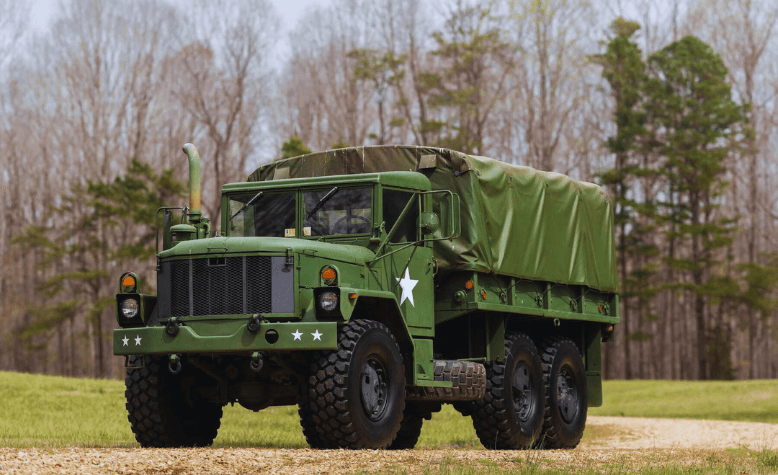Military Truck Insurance: Secure Your Fleet Now!

Military vehicles operate under unique circumstances and face risks that typical commercial vehicles may never encounter. Military truck insurance is a specific type of insurance designed to address these specialized needs, offering protection and peace of mind for government agencies and their contractors. In this overview, we delve into the essentials of military truck insurance, covering what it encompasses, its significance, and the various types of coverage available.
What Is Military Truck Insurance?
Military truck insurance is a specialized insurance policy tailored to cover military vehicles against a wide array of risks. These may include damage from combat operations, theft, accidents during transport, and other liabilities. Insuring military vehicles ensures that the fleets remain operational and capable of fulfilling their roles in national defense and support missions.
Importance Of Insurance For Military Vehicle Fleets
The insurance of military vehicle fleets is of paramount importance. It not only safeguards government assets but also ensures that military operations are not impeded due to vehicle losses or damages. Proper insurance coverage provides financial protection and contributes to the overall readiness and effectiveness of military forces.Types Of Coverage For Military Trucks
Different scenarios and operational environments necessitate a variety of coverage types for military trucks. Coverage options can include:- Comprehensive Coverage: Protects against non-collision-related incidents such as weather damage, vandalism, or theft.
- Collision Coverage: Offers protection in the event of accidents involving another vehicle or object.
- Liability Coverage: Covers the costs of bodily injury and property damage that the insured vehicles may cause to third parties.
- Uninsured Motorist Coverage: Provides protection if the military truck is involved in an accident with an uninsured or underinsured driver.
- Medical Payments/Personal Injury Protection: Offers coverage for medical expenses, regardless of who is at fault in the accident.
Factors Affecting Military Truck Insurance Premiums
Assessing Risk: The Role Of Truck Size And Purpose
The size and purpose of a military truck are often among the first variables insurers consider. Larger trucks with more complex capabilities tend to pose greater risks on the road, potentially leading to heftier insurance premiums. The purpose of these vehicles, whether they are meant for transport or deployed in combat situations, significantly adds to the insurer’s risk assessment.Vehicle Condition And Age Implications For Premiums
Just as with civilian vehicles, the condition and age of military trucks impact insurance costs. Newer models boasting advanced safety features might be eligible for lower premiums, while older trucks could present higher levels of risk and subsequent insurance costs. Insurers meticulously evaluate the vehicle’s maintenance records and any modifications that can affect its usability and safety.- Maintenance history: A well-documented record of regular checks and repairs can lower premiums.
- Modifications: Aftermarket additions that enhance performance or safety could positively influence the insurance rates.
Driver Training And Experience As Cost Determinants
The driver’s training and experience are also significant premium determinants. High-caliber drivers with rigorous military driving training and a clean service record might benefit from reduced insurance costs. Insurers will often consider the driver’s history with military vehicles, any advanced driving qualifications, and the potential risk they represent.Operational Area And Deployment Frequency
Lastly, the operational area and the frequency of deployment are crucial in shaping military truck insurance premiums. Trucks stationed in high-risk or volatile regions are generally subject to higher insurance rates due to the increased likelihood of damage or loss. Similarly, frequent deployments correlate with increased usage and higher insurance costs. Insurers consider both the geographical and operational components when setting the insurance premiums for military trucks.| Operational Area | Deployment Frequency | Implication on Premiums |
|---|---|---|
| Low-risk zone | Infrequent deployment | Potentially lower premiums |
| High-risk zone | Frequent deployment | Increased premiums |
Choosing The Right Insurance Provider For Military Trucks
Evaluating Insurers: Criteria To Consider
When weighing options for a military truck insurance provider, the following criteria should form the core of your research:- Proven Expertise: Insurers with a track record of underwriting military vehicles bring invaluable experience to the table.
- Comprehensive Coverage Options: Look for providers offering a wide range of coverage types, from liability to comprehensive plans that address unique military needs.
- Claims Handling: A provider’s reputation for handling claims efficiently and fairly is crucial for timely support when needed.
- Financial Stability: Verify the insurer’s financial strength ratings through agencies like A.M. Best or Standard & Poor’s to ensure reliability.
- Customer Service: Responsive and knowledgeable customer service representatives can be a lifeline in managing your policy and addressing concerns.
Why Specialized Military Vehicle Insurers Are Crucial
Military trucks are not ordinary vehicles; they have specific requirements and risks that standard auto insurers might not fully cover. A specialized military vehicle insurer brings:| Specialization | Benefits |
|---|---|
| Targeted Coverage | Policies tailored to the unique operational and risk profiles of military vehicles. |
| Regulatory Knowledge | Understanding of governmental and military regulations that could affect coverage. |
| Exclusive Discounts | Access to discounts based on military service or vehicle use. |
Comparing Quotes: Balancing Costs And Coverage
Finding the sweet spot between affordable premiums and adequate coverage is key. To effectively compare quotes, take the following steps:- Identify Coverage Needs: Start by listing the specific coverage needs for your military truck(s).
- Gather Multiple Quotes: Request quotes from several insurers for a comprehensive view of your options.
- Analyze Value: Compare not just the price, but also the extent of coverage, deductibles, and exclusions.
- Read the Fine Print: Understand the terms and conditions to avoid surprises during claims.
- Consider Long-Term Relationship: Choose an insurer that will support your evolving insurance needs over time.
Claim Filing And Management For Military Truck Incidents
Step-by-step Guide On Filing An Insurance Claim
Knowing the correct steps to take immediately after an incident ensures swift claim processing. Here’s a simple guide:- Report the Incident: Immediately inform the relevant authorities and your insurance provider about the incident.
- Document Everything: Collect all necessary information at the scene, including photos, witness statements, and an official report.
- Contact Insurance Representative: A dedicated military vehicle insurance agent can guide you through the process.
- Complete Claim Forms: Fill out all required documentation promptly and accurately.
- Assessment and Repair: The insurance company will assess the damage and authorize repairs.
- Claim Settlement: After repairs, the insurance agency will settle the claim according to your policy terms.
Managing Claims: A Quick Response Guide For Fleet Managers
Fleet managers bear the responsibility of managing claims efficiently to restore normal operations. Employ this quick response guide:- Create a Protocol: Have a clear, documented procedure for drivers to follow in the event of an incident.
- Immediate Action: Ensure all reports and claims are filed without delay to expedite the claims process.
- Track Progress: Maintain regular contact with your insurance provider to monitor the status of your claim.
- Review and Reflect: Post-settlement, analyze the incident to identify potential improvements in safety and operations.
Dealing With Insurance In The Aftermath Of Conflict Or Damage
Post-conflict or damage scenarios can be chaotic. Adhering to a structured approach with your insurance can minimize complications:- Immediate Notification: Communicate with your insurance provider promptly to report the extent of damage.
- Specialized Assessment: Some cases may require assessment by experts familiar with conflict-related damage.
- Comprehensive Coverage Review: Understand the specifics of your policy to ensure all damages are covered.
- Professional Assistance: Consider hiring a claims consultant if dealing with extensive damage or complex claims.

Legal And Regulatory Considerations For Military Truck Insurance
Government Regulations On Military Truck Insurance
Government regulations regarding military truck insurance are complex and can vary significantly depending on the country and the specific application of the vehicles. It’s essential to have a comprehensive grasp of these laws to ensure full compliance and operational readiness. Here are key points military organizations must consider:- Minimum Insurance Requirements: Just like civilian vehicles, military trucks must meet or exceed minimum insurance coverage mandated by law.
- Specialized Coverage: Given the unique roles of military trucks, there may be additional regulations specifying types of coverage, such as third-party liability, comprehensive, or theft and vandalism.
- Geo-specific Laws: The regulatory landscape can change when trucks cross international borders. Knowledge of local laws is imperative for continuous legal compliance.
Compliance Issues For International Operations
As military operations often cross borders, international compliance becomes a considerable challenge. Military truck insurance must consider:- Cross-border Regulations: Identifying and adhering to the insurance regulations of every country in which military trucks operate.
- Conflict and War Zone Clauses: Specific provisions must be made for operating in conflict zones, including coverage for potential damage or loss due to warfare.
- Persistent Coverage: Ensuring that insurance protection remains constant and lapses do not occur during international deployments.
Military Insurance Contracts: Negotiating Terms And Conditions
Striking the right balance in military insurance contracts is critical to safeguarding the interests of all parties involved. During negotiations, attention must be paid to the following considerations:| Aspect | Details |
|---|---|
| Liability Limits | Setting clear caps on coverage amounts to manage potential claims and costs. |
| Deductibles | Agreeing on deductibles that align with the organization’s risk management strategies. |
| Exclusions | Understanding the scenarios and damages excluded from the policy to avoid surprises during claims. |
| Special Provisions | Including clauses for unique operations, equipment, or personnel involved in the use of military trucks. |
Future Of Military Truck Insurance: Trends And Innovations
The Impact Of Technological Advancements On Insurance
Technological innovations have a game-changing effect on the insurance landscape. Cutting-edge tools and software are reshaping how insurance companies assess, manage, and underwrite risks associated with military trucks. These advancements lead to more accurate risk assessments and efficient claims processing, significantly benefiting both insurers and insured parties.Adopting Telematics And Iot For Military Fleet Management
Adoption of Telematics and IoT (Internet of Things) within military fleet management systems is a leap towards enhanced safety and optimized operations. These technologies provide real-time data on vehicle health, location, and usage patterns, enabling proactive maintenance and better mission planning.- Vehicle Tracking: GPS technology ensures precise vehicle location tracking.
- Driver Behaviour: Monitoring systems evaluate driving habits and promote safer practices.
- Maintenance Alerts: Automated alerts for preventive maintenance minimize downtime.
Predictive Analytics: Anticipating Risks And Adjusting Premiums
Predictive analytics is revolutionizing the military truck insurance domain by forecasting potential risks and enhancing decision-making. Sophisticated algorithms analyze vast datasets to anticipate future claims, allowing for dynamic premium adjustments. Insurers can thus offer tailored insurance policies, aligning costs closely with the individual risk levels of each truck or fleet.| Benefit | Description |
|---|---|
| Cost Efficiency | Saving on premiums for low-risk fleets. |
| Accurate Risk Profiling | Detailed insights into fleet risk factors. |
| Claims Reduction | Targeted measures to lower accident rates. |
Frequently Asked Questions
Who Will Insure A Military Humvee?
Specialty insurance companies often provide coverage for military Humvees. Owners must contact insurers that offer policies for unique or military vehicles.
Does Us Military Have Insurance On Vehicles?
Yes, the US military insures its vehicles. Coverage is through the military’s self-insurance program, which handles risks and liabilities associated with vehicle operation.
Does Military Get Cheaper Car Insurance?
Yes, military personnel often receive discounted car insurance rates. Many insurance companies offer special rates as a token of appreciation for their service.
What Insurance Company Does Military Use?
The primary insurance provider for the military is USAA, which offers various insurance services tailored explicitly for military members and their families.
Conclusion
Securing the right coverage for your military truck is crucial. It protects your investment and provides peace of mind. Remember to consult with experts and compare policies. Choose insurance that meets your specific needs and complies with legal requirements. Drive safely, knowing your military truck is well insured.








